Is Butter and MCT Oil In Coffee Good for You?
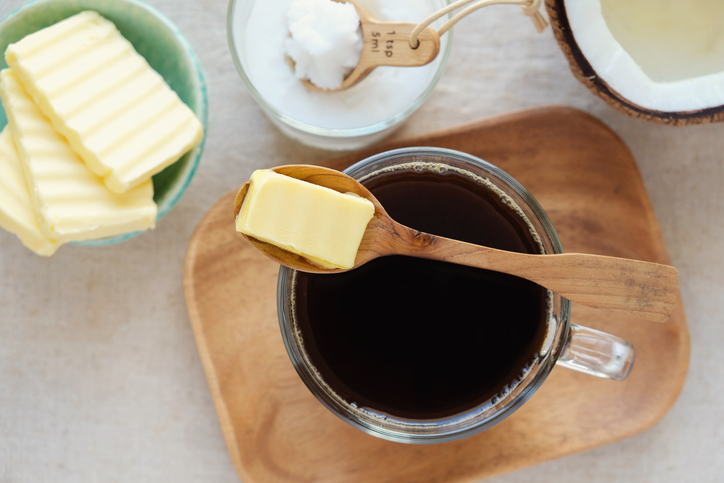
If you’re a coffee lover or follow health fads, you’ve probably heard about the trend of adding butter to your coffee. Some refer to this as being “bullet proof style coffee” (though to officially call it that, you need the trademark symbol). It’s basically what it sounds like: a blend of coffee, butter and MCT oil. This trend has taken off to the point where MCT oil as a supplement has grown tremendously in popularity for its purported benefits to support weight loss, improve focus and energy levels. Is this all too good to be true: does adding butter and MCT to coffee make it a health food? Is MCT oil good for you?
What are Medium-Chain Triglycerides? (MCTs)
Fats come in different shapes and sizes: short, medium and long. Each type of fat has its own unique health benefits (you can read more about some of these fats here). MCTs, which are also known as medium chain fatty acids, are naturally found in the following foods:
- Coconut oil
- Butter
- Cheese
- Palm oil
- Milk
- Yogurt
The main fatty acids found within MCTs are:
- Caproic Acid
- Caprylic Acid
- Capric Acid
- Lauric Acid
MCTs are digested differently from long-chain and short-chain triglycerides. They are absorbed easily and immediately by the body, where they are used for energy rather than being stored as fat. What we don’t use right away, we can then use to make ketones – which can cross the blood-brain barrier and enhance memory and cognitive function. This is why MCT oils are often promoted to enhance brain function and focus.
What is MCT oil?
MCT oil is different from the natural medium-chain triglycerides found in whole food sources. In the process of making MCT oil, specific MCTs are extracted from coconut or palm oil, typically the caprylic or capric acid (or both). These are the specific oils that are thought to help with energy, brain function and cognitive performance. So the fatty acid composition of MCT oil is not the same as what you’d glean from food.
Here are some of the concerns I have about MCT oil production.
- Quality. What happens to the integrity of the MCTs during this process? Fats are sensitive to heat, light and air. While saturated fats are more stable than the delicate omega-3s, I wonder what may be getting destroyed during extraction, not to mention the chemicals applied to the oils in order to glean the specific fatty acids we want (you can learn more about the dangers of fat and oil production here). If you’re going to purchase an MCT oil, research the company and its practices to ensure you are getting what is listed on the bottle.
- Sustainability. Our favourite health foods can have a big environmental impact – and coconut oil and palm oil are two oils that have a large carbon footprint, plus palm oil is connected to a widespread amount of deforestation. I am concerned that further extracting these oils to receive the health benefits from isolated fatty acids will only lead to more environmental damage (and what do they do with the rest of the oil components they don’t use?).
- Cost. MCT oil is quite expensive. While I’m not averse to paying more for quality oils, it seems like having several tablespoons of MCT oil in your coffee every day adds up, more so than if you used coconut oil or made your own ghee.
Health Benefits of MCTs
Medium chain fats are fantastic for our health. Here’s why:
- Weight loss. This meta-analysis of 13 trials showed that MCTs can reduce body weight and change body composition. Other evidence indicates that MCTs can increase satiety, lead to a greater loss of fat stores, and can boost energy levels.
- Cardiovascular health. We have long feared fat as a risk factor for cardiovascular health. However, it’s just the opposite – good fats can benefit our hearts. MCTs reduce cardiovascular risk factors, lower plasma triglycerides, and positively influence blood sugar levels.
- Immunity. Coconut oil contains lauric acid, capric acid and caprylic acid, which have antifungal, antibacterial and antiviral properties. Evidence indicates that they can help bolster the immune system and help us fight infections.
- Brain health and cognitive function. Studies show that MCTs can help to enhance cognitive function, improve memory, and protect the brain from oxidative stress and neurological disorders.
- Liver health. MCTs may help to protect the liver from endotoxins and prevent free radical formation.
- Digestion. Coconut oil is easy to digest and absorb, and studies indicate it can help enhance the good bacteria in the gut. Its anti-microbial properties and help in dealing with various bacteria, fungi, parasites and infections that can impact the digestive tract. Coconut oil also helps in absorption of other nutrients.
how to get the benefits of MCTs
My favourite ways to get the health benefits of MCTs are through using coconut oil and ghee. These are two of my favourite fats and they are easy to use in the kitchen!
Use them:
- As a cooking oil for sauteeing
- In baking, like cookies, muffins, or crumble
- In chocolate and raw treats
- In dairy-free elixirs
- Spread on toast or muffins
- In soups and stews
- To add flavour to cooked grains
Is butter and MCT oil in coffee good for us?
Though I am a fan of butter (mostly ghee, and do champion a fat-rich breakfast!) I’m not a fan of the butter coffee trend, due to the negative benefits of coffee consumption and some of the concerns I have mentioned above about MCT oil. Having butter coffee every once in awhile isn’t going to hurt you, but I do wonder about the impact of having this every single day. As I discussed in my post about the ketogenic diet, some diets and supplements are best used therapeutically.
MCT oil is basically a supplement – and while there may be instances where it is helpful on a short-term therapeutic basis, I always aim to support my health with whole foods as much as possible and use supplements as they are needed, rather than on a constant ongoing basis.
Is butter and MCT Oil in coffee better than conventional cream and sugar? Absolutely! But if you need your morning coffee just to function, that’s when the real questions start to arise. Like all recommendations I make, it’s up to you to decide what’s best for you.
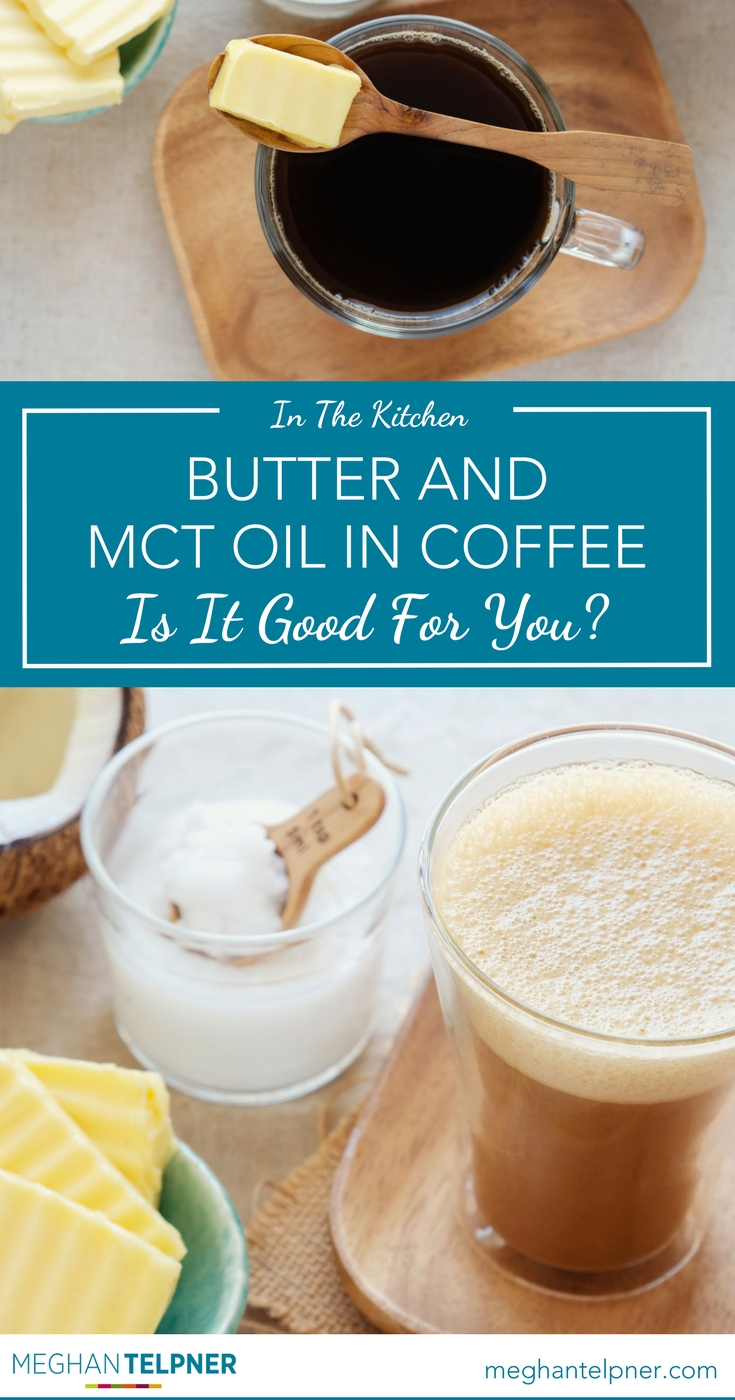
Photo Credit: iStock/ThitareeSarmkasat
Free Resource Library
Enjoy more than 40 downloadable guides, recipes, and resources.


















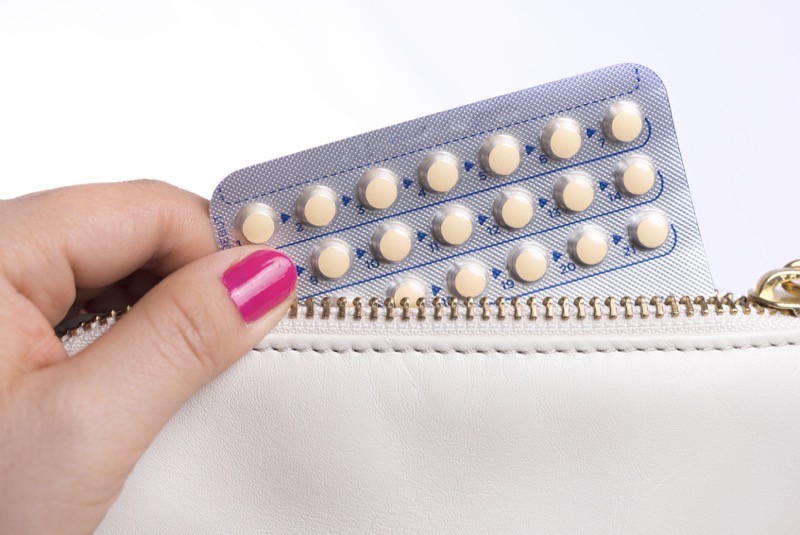
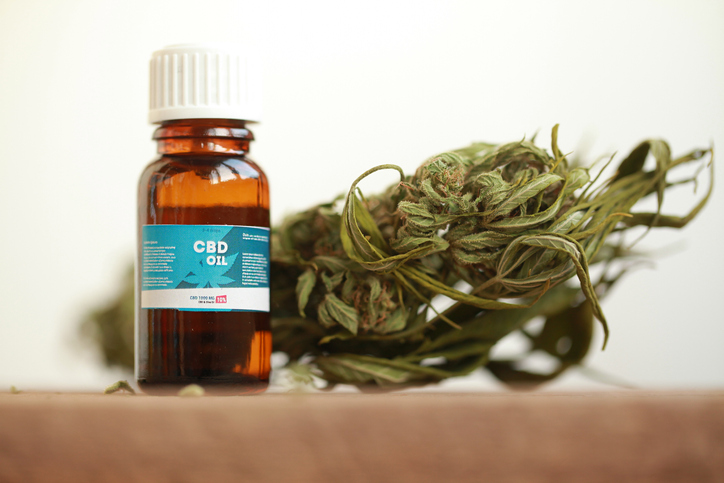
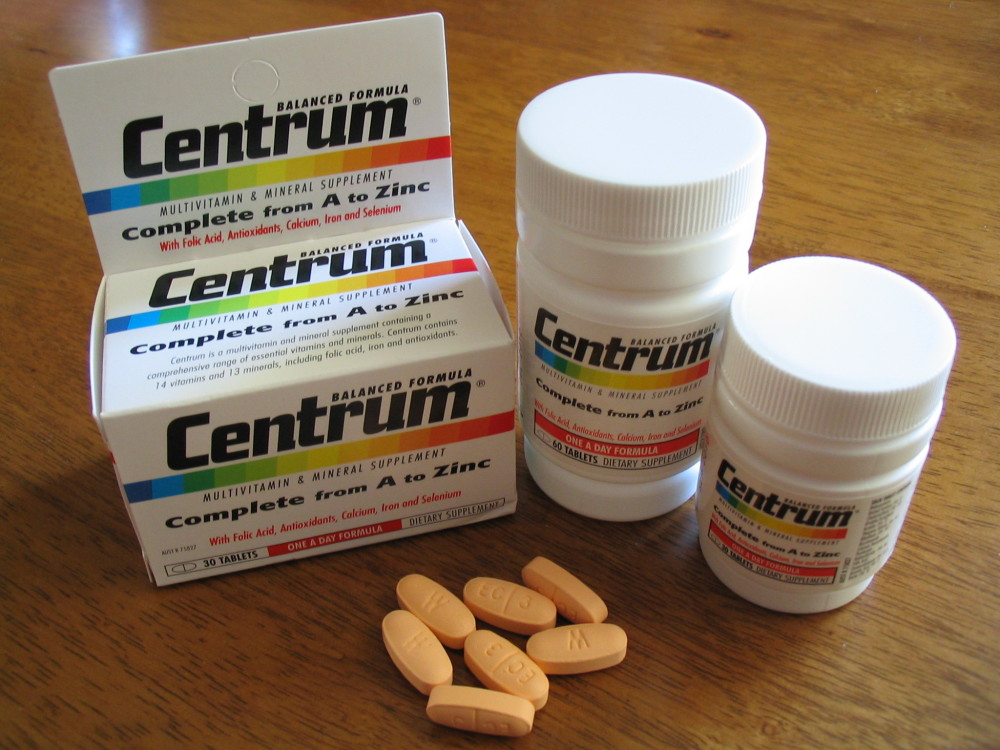



I tried MCT oil in my coffee and had hot flash after hot flash which was new for me, and when I stopped the oil they never came back. (I’m 53)
I like the suggestion of coconut oil and ghee, two of my favorites.
Hi, thanks for the great post!
I have been drinking Bulletproof coffee for almost a year now and have noticed many benefits.
Due to it appetite suppressant effects, I usually don’t feel hungry till lunch time. I always make sure my next meal is super nutritious, to make up for the ‘missed meal’ opportunity.
I enjoy having no cravings (especially sweet cravings) and I find I have sustained energy and I’m able to control my weight effortlessly.
I agree coffee is not for everyone, but through trial and error I’ve discovered that a coffee a day is suitable for my body.
Keep up the good work!!
To get in a healthy frame of mind I ditched coffee for over a year because my 23andme report indicated that I am a slow metabolizer of coffee and that it put me at greater risk for cardiovascular disease. (Those who are fast metabolizes get greater protection if they drink coffee — no fair!) I didn’t notice any difference whether I drink coffee or not. Eventually I went back to coffee cause it’s so damn tasty! I never drink more than 2 and only have it early in the morning. It’s a personal choice.
I couldn’t get used to the butter in my coffee. I think it was the added texture caused by the oily nature of the butter.
You worried about having “several tablespoons of MCT oil in your coffee every day.” I only take one teaspoon of MCT oil in my coffee daily. Six to nine times that amount (2 or 3 tablespoons) would put you in the bathroom too often.